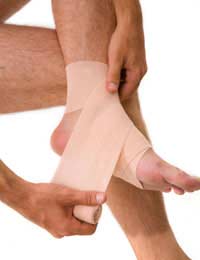Foot Care After Surgery

Recovering from foot surgery requires patience, common sense and self-care. The type of surgery you have had, your age and medical history, and the amount of mobility restriction experienced will also contribute to the type of surgery after-care required.
Tests and Assessment
There are many different types of foot surgery procedures available. Surgery for arthritis, for instance, requires after surgery care that focuses more on rest and recuperation than on gradual flexibility and movement. The type of medical procedure will therefore determine the level of after-care required.Special tests and examinations may be carried out prior to surgery as well as post-surgery, and this may take place in a podiatrist’s clinic or in a hospital environment.
Recovery Time
After surgery you will be issued with post-operative instructions that will highlight the need for care and rest. Information on correct elevation, medication, bandages and the use of walking aids, if required, will also be included. The surgery podiatrist will also book you in for an assessment appointment, where you will be given the opportunity to discuss concerns, mobility issues and the amount of care required for full recovery. Rehabilitation and/or physical therapy may also be suggested.Whilst you may be eager to resume normal activities and movement as soon as possible after surgery it is important to understand the reasons why a recovery period is essential. Reducing pressure to the feet, after surgery, also limits the potential onset of symptoms like painful knee, hip and lower back problems.
Rest and Recuperation
Taking sufficient rest after surgery is important to the health and wellbeing of your feet. If medication, for pain relief, has been prescribed it is important to complete the course. Elevating the foot, to chest height, will help the healing process, as too will walking with assistance, keeping dressings and bandages clean and wearing surgical support if required.It is important to keep bandages dry when showering or bathing. This is best done by wrapping your foot in a large plastic bag and taping the end up so that the dressing does not become wet. Should the bandages become wet however, it is recommended that you contact your GP immediately.
Causes For Concern
Following medical advice will help you ensure you maintain the correct level of surgery after-care best suited to your recovery needs. Regardless of the care you take sometimes post-surgery pain or symptoms may create a cause for concern.If you develop a temperature, experience persistent pain and/or blood appears on the dressing it is important to contact your GP. If your foot is cold or numb, or the dressing feels tight and uncomfortable medical advice is also recommended.
Maintaining Healthy Feet
Once all post-surgery dressings have been removed taking good care of your feet, by ensuring you follow a daily foot care regime, will enable you to reduce the risk of experiencing further discomfort. Ensuring the hosiery and footwear you wear fit your feet properly will reduce problems. Washing, drying and keeping skin soft and supple will also minimise the need to visit a podiatrist.- How to Reduce Cankles
- Cosmetic Foot Surgery
- Anointing Oil for Feet
- Baby Foot Casting
- The Art of Foot Reading
- Reflexology Self Treatment
- How to Take Better Care of Your Feet
- Rough Feet Homemade Remedy
- Winter Foot Care
- The Benefits of a Paraffin Wax Treatment
- Athlete's Foot: Natural Remedies
- Five Steps to an Easy Pedicure
- What is Ayurvedic Footcare?
- Backpacker's Foot Facial
- Acupuncture for Feet
- How to Choose a Podiatrist?
- How to Give a Therapeutic Foot Massage
- How to Give a Home Pedicure
- Walking Socks and Liners
- How to Use Nail Clippers Effectively
- How To Treat Haglands Heel Bumps
- Sport and Foot Problems
- Establishing a Good Foot Care Routine
- Foot Surgery
- Preventing and Treating Cracked Heels
- Feet and Flying
- Guide to Children's Shoes
- Combating Foot Odour
- Preventing and Treating Hard Skin
- Pedicures
- How Reflexology Works Using the Feet
- Podiatry and Chiropody
- Insoles and Orthotics
- Pregnancy and Feet


Re: Burning Feet
Kak esehiko sminor k112 footcareexpert.co.uk
Re: Footcare and the Housebound
My dad is housebound due to 5 major strokes. He walks with a walker and wears a foot splint. The splint is old, heavy and no longer…
Re: Supportive Feet Products for Senior Citizens
I have a prescription from Dr. at OHSU, but I need some lab to make the Orthodic insoles for my shoes. I was…
Re: How to Get into Foot Modelling
I am female 32yrs of age.I am from south africa I would like to enter into feet and hands modelling industry .I know and I…
Re: The Benefits of a Paraffin Wax Treatment
Hi! Does it cure sweaty palm and feet too?
Re: I have Sharp Pains in My Foot, What could it be?
Recently I have been experiencing a stabbing pain in my left foot,its on the bottom at the back. When I…
Re: Fungal Infections of the Foot and Toenail
I have a constant problem with intense itching on my feet which erupts daily, especially when my feet get warm…
Re: Cosmetic Foot Surgery
I have extremely sweaty feet and it seems to be getting worse. I have perspirex, but it doesnt help. Please help, I don't know what to do…
Re: The Benefits of Foot Massage for Children
One day I came home and my wife said our younger son was having trouble concentrating on his homework. I asked…
Re: Cavus Feet: Symptoms, Causes and Treatments
@sue - I am sorry to hear this. As suggested in the article, arch supports or orthotic devices may be used to…